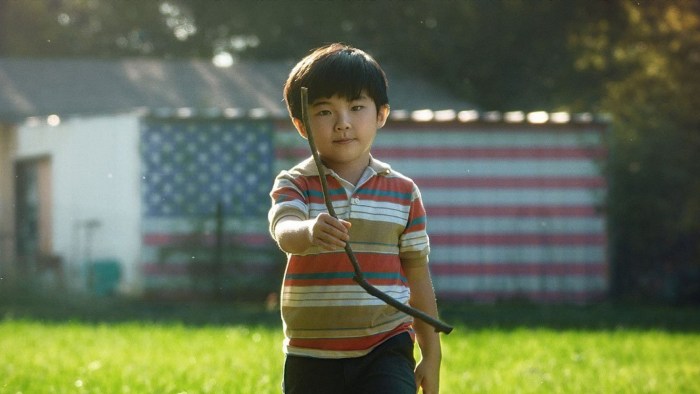Following successful outings for CPH:DOX and the BFI London Film Festival in 2020, and digital editions of Sundance and Rotterdam taking place since the turn of the year, the 2021 Glasgow Film Festival follows suit in going online.
Keen cinephiles across the UK will be able to log in to the Glasgow Film At Home portal, and though compromises have had to be made for GFF seventeen, organisers have paid as much due care and attention to curate another outstanding programme as they have to the well-being of their loyal patrons.
As ever, there is a wealth of homegrown talent on show and an array of diverse, hand-picked international cinema, allowing you to travel the world from your front room. Partnering in 2021 with South Korea for the festival’s Country Focus stream, GFF presents Da Capo (dir. Chan-yang Shim), The Swordsman (dir. Jae-Hoon Choi), Voices of Silence (dir. Eui-jeong Hong), Our Midnight (dir. Jung-eun Lim), and lastly The Man Standing Next (dir. Min-ho Woo), the nation’s Oscar submission.
These are just five of 49 films making their UK premiere at GFF; the festival’s opening night feature is Lee Isaac Chung’s much-lauded Minari, a human drama following a Korean family’s move and integration to life in rural Arkansas in the 1980s. Chinese directors Layla Zhuqing Ji and Yang Lina bring their respective films, Victim(s) and Spring Tide, to Glasgow. The former, the filmmaker’s feature debut, tackles school bullying and knife crime, and the latter the familial conflict of three generations of women from one family.

Spanning more than fifteen years of failure, murder, and a quest for the truth in a young man’s life, Xiaofeng Li’s Back to the Wharf is another Mandarin-language feature to seek out. With several films shortlisted for GFF’s Audience Award strand, European cinema is also very well represented this year. Police brutality in Copenhagen comes to the fore in Anders Ølholm and Frederik Louis Hviid’s Danish thriller Shorta; perpetual Irish rain causes Aaron Monaghan to grieve in more ways than one in Philip Doherty’s black comedy debut Redemption of a Rogue; Hungarian filmmaker Lili Horvát’s sophomore feature Preparations to be Together blurs the lines of reality with a murky tail of lust and obsession.
And two further female first-time directors complete the dramatic features for your consideration. Zoé Wittock’s Jumbo sees Noémie Merlant (Portrait of a Lady on Fire) fall in love with an amusement park ride, and Sweetheart is Marley Morrison’s sharp, awkward, Dorset caravan park-set coming-of-ager – both are not to be missed. Straddling the divide to an impressive documentary line-up, Ollie Aslin and Gary Lennon’s Castro’s Spies – detailing the undercover activities of the The Cuban Five – is the sole non-dramatic feature up for the Audience Award. Elsewhere, after the overwhelming acclaim heaped on Flee (Jonas Poher Rasmussen) at Sundance, Ilze Burkovska Jacobsen’s My Favorite War is a standout of the documentary selection. Blending animation, library footage and personal testimony, it tells of the Latvian filmmaker’s first-hand experience of the Cold War, growing up in the 1970s and 1980s.
In Luke White’s Handsome, which makes its World Premiere at Glasgow, two brothers – one of whom has Down’s Syndrome – travel the globe to better understand their relationship and what the future may hold. Further additions to a bumper doc programme include: Frederick Wiseman’s mammoth City Hall which takes us inside the city of Boston’s government; Dogwoof bring Lisa Immordino Vreeland’s Truman & Tennessee: An Intimate Conversation to the festival, pitting two 20th century literary greats against one another.

Eamonn Ashton-Atkinson’s Steelers goes behind the scenes of the world’s first gay rugby team in Kings Cross, and following his Oscar win for Icarus in 2017, Bryan Fogel returns to screens with The Dissident, piecing together the disappearance and death of Washington Post journalist Jamal Khashoggi, and following cover up. Viktor Kossakovsky’s Gunda, recently shortlisted by The Academy for Best Documentary Feature, will be the icing on the cake for hungry doc-lovers. But if hiding behind your sofa or peering out from behind a cushion scared out of your wits is more your thing, then the FrightFest strand has you covered.
Fresh from the launch of their very own cult movie streaming service, Arrow Video’s selection of thrillers, chillers and downright horrors from France, Canada and the US will be your go-to. Importantly using their platform to showcase and champion Scottish cinema, the festival boasts a whole host of local talent. Glaswegian director Kevin Macdonald’s The Mauritanian is a star-studded adaptation of Mohamedou Ould Slahi’s memoir detailing the years he spent detained at Guantanamo. Making its first appearance for Scottish audiences, Ben Sharrock’s absurdist comedy, and critically acclaimed second film, Limbo, ventures to a refugee centre on the remote Uist islands.
Composed entirely of Scottish Gaelic testimony, and sure to be a mesmerising, visually striking, lyrical documentary, Iorram (Boat Song) by Alastair Cole takes placed among the Outer Hebrides fishing community. A bountiful catch with something for everyone, then, the curtain will fall on this year’s Glasgow Film Festival looking to seasons – and hopefully brighter times – ahead with Suzanne Lindon’s Spring Blossom. Daughter of French cinema heavyweights Vincent Lindon and Sandrine Kiberlain, this semi-autobiographical piece sees the young filmmaker explore life and love on the streets of Montmartre to establish her own mark on the world.
*Late additions to the programme include First Cow, Tina and Sir Alex Ferguson: Never Give In.
The 2021 Glasgow Film Festival takes place between the 24 February to 7 March. You can follow CineVue’s coverage here.
Matthew Anderson | @MattAndo63

